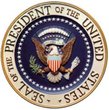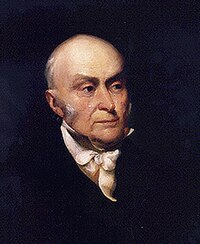John Quincy Adams
From Wikipedia, the free encyclopedia.
| Term of office | March 4, 1825 – March 3, 1829 |
| Preceded by | James Monroe |
| Succeeded by | Andrew Jackson |
| Date of birth | July 11, 1767 |
| Place of birth | Braintree, Massachusetts |
| Spouse | Louisa Catherine (Johnson) Adams |
| Political party | National Republican, later United States Whig Party |
John Quincy Adams (July 11, 1767 – February 23, 1848) was the sixth (1825-1829) President of the United States. The son of President John Adams and First Lady Abigail Smith, he was the only son of a former President to become President himself until George W. Bush took office in 2001.
Adams's most important contributions to American history came before and after his relatively ineffective term as President. Before becoming President, he was the most experienced diplomat in the United States. While serving as Secretary of State under President James Monroe, Adams negotiated the Adams-Onís Treaty with Spain and devised the Monroe Doctrine, both of which were of long lasting importance. For these activities he has been called "the most influential American grand strategist of the nineteenth century" and "perhaps the greatest secretary of state in American history."1
Adams was elected to the U.S. House of Representatives in 1830, one of only two U.S. Presidents to serve in Congress after having been President. (Andrew Johnson was elected to the U.S. Senate in 1875.) As a Congressman, Adams became an opponent of slavery, and because he was an ex-president, he became one of the most prominent supporters of abolition in the country.
Contents |
Biography
Adams was born in Braintree, Massachusetts in a part of town which eventually became the separate town of Quincy. His birthplace is open to the public, as is the nearby cairn marking the site from which he viewed the Battle of Bunker Hill as a 7-year-old boy. He acquired his early education in Europe at venerable institutions such as the University of Leiden while accompanying his father while the elder Adams was serving as an American envoy to France and later the Netherlands during the Revolutionary War. He graduated from Harvard University in 1787 and was elected to Phi Beta Kappa. He studied law after which he was admitted to the bar and commenced practice in Boston.
President George Washington appointed him Minister to the Netherlands in 1794, Minister to Portugal in 1796 and Minister to Prussia in 1797. While serving abroad, he met Louisa Catherine Johnson, the daughter of an American merchant living abroad. Despite his father's opposition to him having a foreign-born wife, Adams wed Louisa Johnson in 1797. The couple named one of their sons after George Washington. (As of 2005, Adams is the only U.S. President to do so.)
He afterwards returned to Quincy where he lived in the "Old House" (now a museum). He began his political career in 1802 when he was elected to the Massachusetts State Senate. Adams was an unsuccessful candidate for election to the U.S. House of Representatives in the same year. He was elected as a Federalist to the United States Senate and served from March 4, 1803, until June 8, 1808, when he resigned, a successor having been elected six months early after Adams broke with the Federalist Party.
He was Minister (Ambassador) to Russia from 1809 to 1814, a member of the commission which negotiated the Treaty of Ghent in 1814, and Minister to the United Kingdom from 1815 to 1817. During this time, Adams and his wife lost to illness an infant daughter, born in 1811.
He was Secretary of State in the Cabinet of President James Monroe from 1817 to 1825, a tenure during which he was instrumental in the acquisition of Florida and in keeping the United States from becoming dependent on England. He was sometimes called the "Lone Wolf" for his positions during this time because he often did not go with everyone else's opinion. Typically, however, his alone were the ones that Monroe decided upon. As Secretary of State, he negotiated the Adams-Onís Treaty and helped develop the Monroe Doctrine, which warned European nations not to meddle in affairs of the Western Hemisphere.
Adams received one electoral vote in the presidential election of 1820. President James Monroe ran virtually unopposed for re-election, but one elector cast his ballot for Adams, allegedly to ensure that George Washington remained the only American president unanimously chosen by the electoral college.
Presidency
Election to Presidency
Although Adams lost in both the popular and electoral votes in the Presidential election of 1824, none of the candidates were able to secure a majority of the electoral vote, thereby putting the outcome in the hands of the House of Representatives, which to the surprise of many elected Adams over rival Andrew Jackson. Some say this was because of a bargain he struck with Henry Clay, which put Clay into office as his Secretary of State once Adams won. Adams served as President from March 4, 1825 to March 3, 1829. During this time he worked on developing a federal system of roads, canals, bridges, lighthouses, and universities until Jackson, who defeated Adams in the latter's quest for re-election, was sworn in to replace him.
Cabinet
| OFFICE | NAME | TERM |
| President | John Quincy Adams | 1825–1829 |
| Vice President | John C. Calhoun | 1825–1829 |
| Secretary of State | Henry Clay | 1825–1829 |
| Secretary of the Treasury | Richard Rush | 1825–1829 |
| Secretary of War | James Barbour | 1825–1828 |
| Peter Porter | 1828–1829 | |
| Attorney General | William Wirt | 1825–1829 |
| Postmaster General | John McLean | 1825–1829 |
| Secretary of the Navy | Samuel Southard | 1825–1829 |
Supreme Court appointments
Adams appointed the following Justices to the Supreme Court of the United States:
States admitted to the Union
None
Later life
Rather than retire, Adams would go on to win election as a Democratic-Republican to the House of Representatives beginning with the 22nd Congress, serving from March 4, 1831, until his death. He was chairman of the Committee on Manufactures (for the 22nd through 26th, 28th and 29th Congresses, respectively), the Committee on Indian Affairs (for the 27th Congress) and the Committee on Foreign Affairs (also for the 27th Congress).
He was an unsuccessful candidate for Governor of Massachusetts in 1834. In 1841, Adams represented the Amistad Africans in the Supreme Court of the United States and successfully argued that the Africans, who had seized control of a Spanish ship where they were being held as illegal slaves, should not be returned to Spain, but returned home as free people.
Adams's son Charles Francis also pursued a career in politics.
Adams died of a cerebral hemorrhage on February 23, 1848 in the Capitol Building, Washington, D.C.. His interment was in the family burial ground at Quincy, Massachusetts and he was subsequently reinterred after his wife's death in a family crypt in the United First Parish Church across the street, where his tomb can be viewed today.
Trivia
- John Quincy Adams was the first President whose father was also President. The second father-son duo is Presidents George H. W. Bush and George W. Bush.
- He was the first U.S. President to wear long pants instead of knee britches.
- He was the first U.S. President to give an interview to a woman; however, he did not have much choice. Adams had repeatedly refused requests for an interview with Anne Royall, the first female professional journalist in the U.S., so she took a different approach to accomplish her goal. She learned that Adams liked to take nude dips in the Potomac River almost every morning around 5 a.m., so she went to the river, gathered his clothes and sat on them until he answered all of her questions. [1]
Related articles
- U.S. presidential election, 1820
- U.S. presidential election, 1824
- U.S. presidential election, 1828
- Mount Quincy Adams
- Adams-Onis Treaty
- Treaty of Ghent
Notes
- Note 1: "Influential grand strategist": John Lewis Gaddis, Surprise, Security, and the American Experience (Cambridge, Massachusetts: Harvard University Press, 2004, ISBN 0674011740), p. 15. "Greatest secretary of state": Samuel Flagg Bemis.
External links
- July 4, 1821 Independence Day Speech
- Inaugural Address
- Biography of John Quincy Adams
- First State of the Union Address of John Quincy Adams
- Second State of the Union Address of John Quincy Adams
- Third State of the Union Address of John Quincy Adams
- Fourth State of the Union Address of John Quincy Adams
- Works by John Quincy Adams at Project Gutenberg
- Unitarian Universalist site - article on John Quincy Adams
- White House Biography
| Presidents of the United States of America |  |
|---|---|
| Washington | J Adams | Jefferson | Madison | Monroe | JQ Adams | Jackson | Van Buren | W Harrison | Tyler | Polk | Taylor | Fillmore | Pierce | Buchanan | Lincoln | A Johnson | Grant | Hayes | Garfield | Arthur | Cleveland | B Harrison | Cleveland | McKinley | T Roosevelt | Taft | Wilson | Harding | Coolidge | Hoover | F Roosevelt | Truman | Eisenhower | Kennedy | L Johnson | Nixon | Ford | Carter | Reagan | GHW Bush | Clinton | GW Bush |
| United States Secretaries of State |  |
|---|---|
| Jefferson | Randolph | Pickering | J Marshall | Madison | Smith | Monroe | Adams | Clay | Van Buren | Livingston | McLane | Forsyth | Webster | Upshur | Calhoun | Buchanan | Clayton | Webster | Everett | Marcy | Cass | Black | Seward | Washburne | Fish | Evarts | Blaine | Frelinghuysen | Bayard | Blaine | Foster | Gresham | Olney | Sherman | Day | Hay | Root | Bacon | Knox | Bryan | Lansing | Colby | Hughes | Kellogg | Stimson | Hull | Stettinius | Byrnes | G Marshall | Acheson | Dulles | Herter | Rusk | Rogers | Kissinger | Vance | Muskie | Haig | Shultz | Baker | Eagleburger | Christopher | Albright | Powell | Rice |
Categories: 1767 births | Adams family | Children of U.S. Presidents | 1848 deaths | Massachusetts State Senators | U.S. Secretaries of State | U.S. Representatives from Massachusetts | Unitarian Universalists | United States Senators from Massachusetts | Presidents of the United States | Failed Nominees to the U.S. Supreme Court





